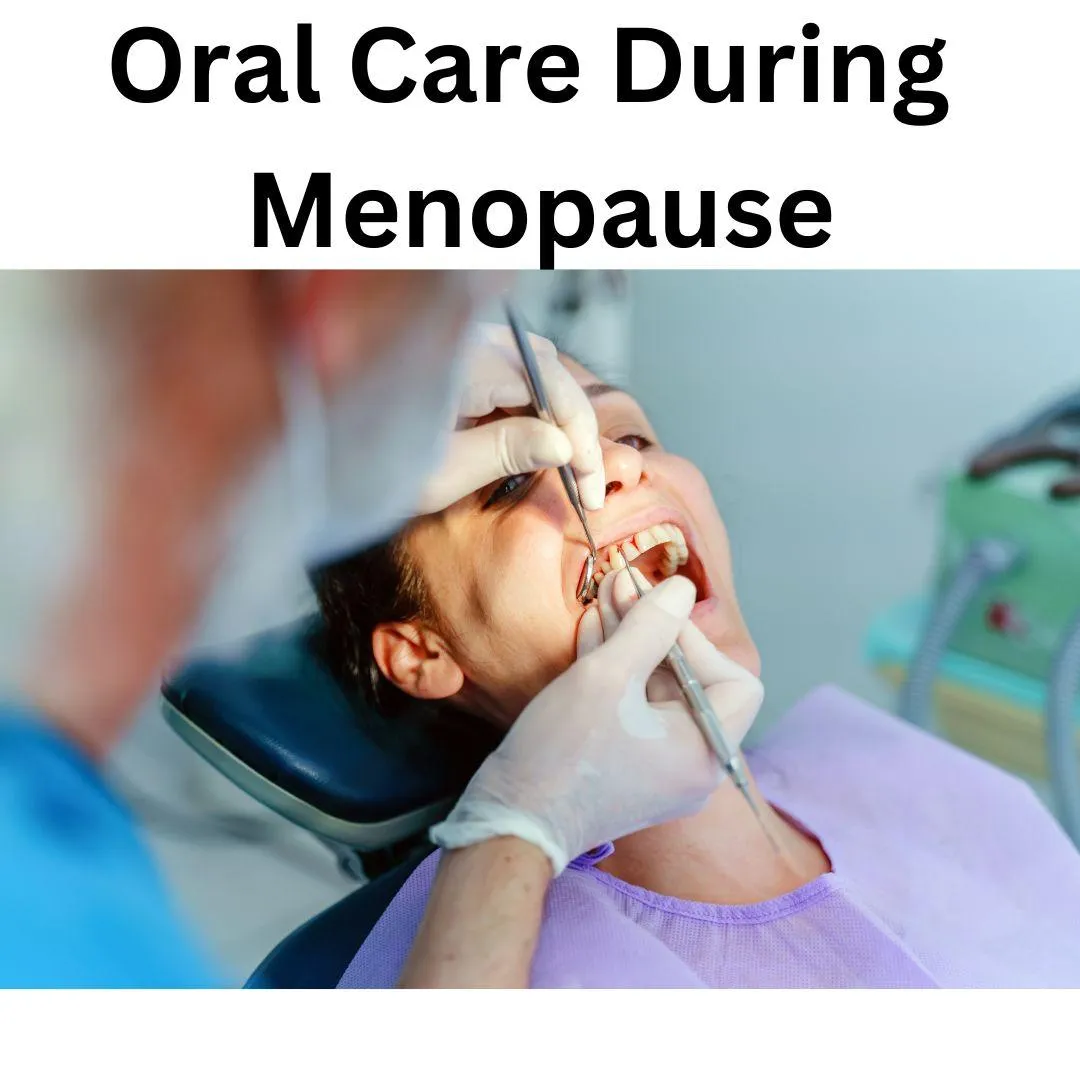*Open to Florida Residents
Blog
Blog

Impact of Hormonal Changes on Oral Health During Menopause
During menopause, hormonal changes can significantly affect a woman's overall health, including oral health. Understanding the importance of dental care and how to maintain good oral hygiene during this time is essential for preventing potential complications.
Menopause is marked by a significant decrease in the levels of estrogen and progesterone, two hormones that influence many bodily systems, including the oral cavity. This hormonal shift can lead to a variety of oral health problems:
Dry Mouth (Xerostomia): Reduced estrogen levels can decrease saliva production, causing dry mouth. Saliva is essential for neutralizing acids, washing away food particles, and keeping the mouth lubricated. A lack of saliva can lead to a higher risk of tooth decay, gum disease, and infections.
Gum Disease (Periodontal Disease): Hormonal changes can make the gums more sensitive and prone to inflammation. This can lead to gingivitis (early gum disease) or worsen existing periodontal conditions, causing swollen, bleeding, and receding gums. Women in menopause may also be at a higher risk for bone loss in the jaw, which can affect teeth stability.
Bone Loss (Osteoporosis): Estrogen plays a key role in maintaining bone density, and the decline in estrogen during menopause can lead to osteoporosis. This condition affects the bones in the body, including the jawbone that supports the teeth, potentially leading to tooth loss and other dental issues.
Burning Mouth Syndrome: This is a condition where a burning sensation occurs in the mouth, often without an obvious cause. Hormonal fluctuations during menopause can make women more susceptible to this painful condition, which may affect the tongue, lips, or entire mouth.
Altered Taste Sensations: Some women experience changes in their ability to taste food. This can be linked to both the hormonal changes and a dry mouth, making eating less enjoyable and sometimes leading to poor dietary choices that can further affect oral health.
Importance of Dental and Oral Care During Menopause
Proper dental care during menopause is crucial to prevent long-term damage and maintain a healthy smile. Here’s why it’s important:
Prevention of Gum Disease: Regular dental check-ups can help detect early signs of gum disease and other oral health issues, allowing for prompt treatment.
Avoiding Tooth Decay: Saliva plays a protective role in oral health, so keeping the mouth moist and practicing good dental hygiene can prevent cavities.
Maintaining Bone Health: Ensuring good jawbone health is essential for keeping teeth stable. Regular dental visits can help track changes in bone density and manage issues early.
Overall Well-being: Oral health is linked to overall health. Untreated dental issues can lead to systemic conditions like heart disease and diabetes.
Tips for Improving Oral Health During Menopause
Stay Hydrated: Drinking plenty of water can help combat dry mouth. Chewing sugar-free gum or sucking on sugar-free lozenges may also stimulate saliva production.
Use Fluoride Products: Fluoride toothpaste and mouth rinses can help strengthen tooth enamel and reduce the risk of decay, which may be more likely with dry mouth.
Maintain Regular Dental Check-ups: Frequent visits to the dentist (at least twice a year) are essential for early detection of problems and professional cleaning.
Practice Good Oral Hygiene: Brushing at least twice a day with a soft-bristled toothbrush and flossing daily are crucial to maintaining healthy teeth and gums, especially when hormonal changes make the gums more vulnerable.
Consider Hormone Replacement Therapy (HRT): HRT can help stabilize hormone levels and potentially reduce the oral health issues associated with menopause, though it’s essential to consult a healthcare provider about the benefits and risks.
Eat a Healthy Diet: A balanced diet rich in calcium and vitamin D supports bone health, which is crucial for the jaw and teeth. Foods like dairy, leafy greens, nuts, and fortified products can help maintain bone density.
Avoid Tobacco and Limit Alcohol: Smoking and alcohol can exacerbate dry mouth and contribute to gum disease, so avoiding these substances can improve oral and overall health.
Conclusion
Maintaining oral health during menopause requires extra attention due to the hormonal changes that affect the mouth, gums, and bones. By staying vigilant about dental care, maintaining hydration, and practicing good oral hygiene, women can prevent many of the common oral health issues associated with menopause. Regular dental visits, coupled with lifestyle adjustments like a nutritious diet and possibly HRT, can support a healthy mouth and improve quality of life during this transition.

Impact of Hormonal Changes on Oral Health During Menopause
During menopause, hormonal changes can significantly affect a woman's overall health, including oral health. Understanding the importance of dental care and how to maintain good oral hygiene during this time is essential for preventing potential complications.
Menopause is marked by a significant decrease in the levels of estrogen and progesterone, two hormones that influence many bodily systems, including the oral cavity. This hormonal shift can lead to a variety of oral health problems:
Dry Mouth (Xerostomia): Reduced estrogen levels can decrease saliva production, causing dry mouth. Saliva is essential for neutralizing acids, washing away food particles, and keeping the mouth lubricated. A lack of saliva can lead to a higher risk of tooth decay, gum disease, and infections.
Gum Disease (Periodontal Disease): Hormonal changes can make the gums more sensitive and prone to inflammation. This can lead to gingivitis (early gum disease) or worsen existing periodontal conditions, causing swollen, bleeding, and receding gums. Women in menopause may also be at a higher risk for bone loss in the jaw, which can affect teeth stability.
Bone Loss (Osteoporosis): Estrogen plays a key role in maintaining bone density, and the decline in estrogen during menopause can lead to osteoporosis. This condition affects the bones in the body, including the jawbone that supports the teeth, potentially leading to tooth loss and other dental issues.
Burning Mouth Syndrome: This is a condition where a burning sensation occurs in the mouth, often without an obvious cause. Hormonal fluctuations during menopause can make women more susceptible to this painful condition, which may affect the tongue, lips, or entire mouth.
Altered Taste Sensations: Some women experience changes in their ability to taste food. This can be linked to both the hormonal changes and a dry mouth, making eating less enjoyable and sometimes leading to poor dietary choices that can further affect oral health.
Importance of Dental and Oral Care During Menopause
Proper dental care during menopause is crucial to prevent long-term damage and maintain a healthy smile. Here’s why it’s important:
Prevention of Gum Disease: Regular dental check-ups can help detect early signs of gum disease and other oral health issues, allowing for prompt treatment.
Avoiding Tooth Decay: Saliva plays a protective role in oral health, so keeping the mouth moist and practicing good dental hygiene can prevent cavities.
Maintaining Bone Health: Ensuring good jawbone health is essential for keeping teeth stable. Regular dental visits can help track changes in bone density and manage issues early.
Overall Well-being: Oral health is linked to overall health. Untreated dental issues can lead to systemic conditions like heart disease and diabetes.
Tips for Improving Oral Health During Menopause
Stay Hydrated: Drinking plenty of water can help combat dry mouth. Chewing sugar-free gum or sucking on sugar-free lozenges may also stimulate saliva production.
Use Fluoride Products: Fluoride toothpaste and mouth rinses can help strengthen tooth enamel and reduce the risk of decay, which may be more likely with dry mouth.
Maintain Regular Dental Check-ups: Frequent visits to the dentist (at least twice a year) are essential for early detection of problems and professional cleaning.
Practice Good Oral Hygiene: Brushing at least twice a day with a soft-bristled toothbrush and flossing daily are crucial to maintaining healthy teeth and gums, especially when hormonal changes make the gums more vulnerable.
Consider Hormone Replacement Therapy (HRT): HRT can help stabilize hormone levels and potentially reduce the oral health issues associated with menopause, though it’s essential to consult a healthcare provider about the benefits and risks.
Eat a Healthy Diet: A balanced diet rich in calcium and vitamin D supports bone health, which is crucial for the jaw and teeth. Foods like dairy, leafy greens, nuts, and fortified products can help maintain bone density.
Avoid Tobacco and Limit Alcohol: Smoking and alcohol can exacerbate dry mouth and contribute to gum disease, so avoiding these substances can improve oral and overall health.
Conclusion
Maintaining oral health during menopause requires extra attention due to the hormonal changes that affect the mouth, gums, and bones. By staying vigilant about dental care, maintaining hydration, and practicing good oral hygiene, women can prevent many of the common oral health issues associated with menopause. Regular dental visits, coupled with lifestyle adjustments like a nutritious diet and possibly HRT, can support a healthy mouth and improve quality of life during this transition.
Let me help you achieve your goals.
Disclaimer: We understand that every individual's experience is unique and results may vary depending on various factors, such as attitude, adaptability, personal history, and overall health. For your safety and well-being, we highly recommend consulting your physician before beginning any program. At Elite Sexual Hormone Health, we do not diagnose, treat, or prescribe any medical or psychological disorders. We urge you to seek the care of a qualified physician or psychotherapist if you suffer from any psychological or medical disorder. Thank you for choosing Elite Sexual Hormone Health as your partner in your journey towards wellness.
© 2025, Elite Sexual Hormone Health. All rights reserved.
Privacy Policy | Terms of Service | Disclaimer
© 2025, Elite Sexual Hormone Health. All rights reserved.
Website by Hypnotherapy Accelerator





